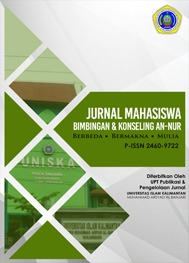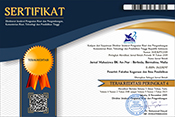KONSELING KELOMPOK MODEL KIPAS (KONSELING INTENSIF, PROGRESIF, ADAPTIF, TERSTRUKTUR) UNTUK MENINGKATKAN MINAT BERWIRAUSAHA SISWA SMK DI MASA PANDEMI COVID-19
(1) Universitas Muria Kudus
(2) Universitas Muria Kudus, ID Scopus : 57215550652,
(3) Universitas Muria Kudus
(*) Corresponding Author
Sari
Kata Kunci
Teks Lengkap:
PDFReferensi
ABKIN. (2007). Penataan Pendidikan Profesional Konselor dan Layanan Bimbingan dan Konseling dalam Jalur Pendidikan Formal. Direktorat Jendral Pendidikan Tinggi Departemen Pendidikan Nasional.
Amankwah-Amoah, J., Boso, N., & Antwi-Agyei, I. (2018). The Effects of Business Failure Experience on Successive Entrepreneurial Engagements: An Evolutionary Phase Model. Group and Organization Management, 43(4), 648–682. https://doi.org/10.1177/1059601116643447
Anderson, A. R., & Warren, L. (2011). The entrepreneur as hero and jester: Enacting the entrepreneurial discourse. International Small Business Journal, 29(6), 589–609. https://doi.org/10.1177/0266242611416417
Astuti, B., & Edi Purwanta. (2019). Bimbingan Karier untuk meningkatkan Kesiapan karier. UNY Press. https://books.google.co.id/books?id=IZe-DwAAQBAJ&hl=id&source=gbs_slider_cls_metadata_7_mylibrary
Awlawi, A. H., Mappiare, A., Hidayah, N., & Muslihati, M. (2020). DIDONG ART AND MULTICULTURAL COUNSELING GROUP : META-ANALYSIS. Journal of Critical Reviews, 7(14), 825–829.
Bacq, S., Ofstein, L. F., Kickul, J. R., & Gundry, L. K. (2017). Perceived entrepreneurial munificence and entrepreneurial intentions: A social cognitive perspective. International Small Business Journal: Researching Entrepreneurship, 35(5), 639–659. https://doi.org/10.1177/0266242616658943
Begley, T. M., & Tan, W. L. (2001). The Socio-Cultural Environment for Entrepreneurship: A Comparison Between East Asian and Anglo-Saxon Countries. Journal of International Business Studies 2001 32:3, 32(3), 537–553. https://doi.org/10.1057/PALGRAVE.JIBS.8490983
Bell, R., Liu, P., Zhan, H., Bozward, D., Fan, J., Watts, H., & Ma, X. (2019). Exploring entrepreneurial roles and identity in the United Kingdom and China. International Journal of Entrepreneurship and Innovation, 20(1), 39–49. https://doi.org/10.1177/1465750318792510
Cardow, A., & Smith, R. (2015). Using Innovative Pedagogies in the Classroom: Re-Storying Gothic Tales as Entrepreneur Stories. Industry and Higher Education, 29(5), 361–374. https://doi.org/10.5367/IHE.2015.0268
Clarke, J., & Holt, R. (2010). The mature entrepreneur: A narrative approach to entrepreneurial goals. Journal of Management Inquiry, 19(1), 69–83. https://doi.org/10.1177/1056492609343030
Cottone, R. R. (2012). Paradigms of Counseling and Psychotherapy (Issue March). Smashword.
Creswel, J. W. (2009). Research design: Qualitative, quantitative, and mixed methods approaches. Los Angeles: University of Nebraska–Lincoln.
Creswell, J. W., & Creswell, J. D. (2018). Research Design Qualitative, Quantitative, and Mixed Methods Approaches.
Damayanti, D., & Widyowati, A. (2018). Peningkatan Career Decison Making Self Efficacy (CDMSE) Melalui Pelatihan Perencanaan Karir pada Siswa SMK. Humanitas, 15(1), 35. https://doi.org/10.26555/humanitas.v15i1.7409
Etzkowitz, H. (2013). StartX and the “Paradox of Success”: Filling the gap in Stanford’s entrepreneurial culture. Social Science Information, 52(4), 605–627. https://doi.org/10.1177/0539018413498833
Farmer, S. M., Yao, X., & Kung-Mcintyre, K. (2011). The Behavioral Impact of Entrepreneur Identity Aspiration and Prior Entrepreneurial Experience. Entrepreneurship: Theory and Practice, 35(2), 245–273. https://doi.org/10.1111/J.1540-6520.2009.00358.X
Fis, A. M., Ozturkcan, S., & Gur, F. (2019). Being a Woman Entrepreneur in Turkey: Life Role Expectations and Entrepreneurial Self-Efficacy. SAGE Open, 9(2). https://doi.org/10.1177/2158244019846192
Gauthier, C., Bastianutti, J., & Haggège, M. (2018). Managerial capabilities to address digital business models: The case of digital health. Strategic Change, 27(2), 173–180. https://doi.org/10.1002/jsc.2192
Gladding, S. T., & Crockett, J. E. (2019). Religious and spiritual issues in counseling and therapy: Overcoming clinical barriers. Journal of Spirituality in Mental Health, 21(2), 152–161. https://doi.org/10.1080/19349637.2018.1476947
Gudnanto, Pravesti, C. A., Wahyuni, F., & Kiswantoro, A. (2017). Aksiologi Spiritualitas dalam Konseling. Jurnal Konseling GUSJIGANG, 3(1), 114–127. https://doi.org/10.24176/jkg.v3i1.1724
Habsy, B. A., Hidayah, N., Lasan, B. B., Muslihati, & Fudholi, A. (2019). The development model of semar counselling to improve the self-esteem of vocational students with psychological distress. International Journal of Emerging Technologies in Learning, 14(10), 132–149. https://doi.org/10.3991/ijet.v14i10.10221
Heppner, P. P., Wampold, B. E., & Kivlighan Jr, D. M. (2008). Research Design in Counseling. Thomson Brooks/Cole.
Hidayat, D. R., Wening Cahyawulan, & Alfan, R. (2019). Karier: Teori dan Aplikasi dalam Bimbingan dan Konseling Komprehensif. Jejak Publisher. https://books.google.co.id/books?id=6i_SDwAAQBAJ&hl=id&source=gbs_slider_cls_metadata_7_mylibrary
Hidayati, D. R., & Setiani. (2018). Faktor Pembeda Implementasi Bisnis Berkelanjutan (Sustainable Business) Pada Wirausaha Mahasiswa Universitas Trunojoyo Madura. Jurnal Sosial Ekonomi Dan Kebijakan Pertanian, 7(2), 176–187. https:http://journal.trunojoyo.ac.id/agriekonomika/article/view/1758
Hollen, P. J., Hobbie, W. L., Donnangelo, S. F., Shannon, S., & Erickson, J. (2007). Substance use risk behaviors and decision-making skills among cancer-surviving adolescents. Journal of Pediatric Oncology Nursing, 24(5), 264–273. https://doi.org/10.1177/1043454207304910
Holm, E. J. van. (2021). Making Entrepreneurs? Makerspaces and Entrepreneurial Intent Among High School Students. Journal of Entrepreneurship, 30(2), 249–266. https://doi.org/10.1177/09713557211025652
Ibn-Mohammed, T., Mustapha, K. B., Godsell, J., Adamu, Z., Babatunde, K. A., Akintade, D. D., Acquaye, A., Fujii, H., Ndiaye, M. M., Yamoah, F. A., & Koh, S. C. L. (2021). A critical review of the impacts of COVID-19 on the global economy and ecosystems and opportunities for circular economy strategies. Resources, Conservation and Recycling, 164(September 2020), 105169. https://doi.org/10.1016/j.resconrec.2020.105169
Jaedun, A., Sutarto, & Ikhwanuddin. (2014). Model Pendidikan Karakter di SMK Melalui Program Pengembangan Diri dan Kultur Sekolah. Jurnal Pendidikan Teknologi Dan Kejuruan, 22(2), 163–172. https://doi.org/10.21831/jptk.v22i2.8924
Levenburg, N. M., & Schwarz, T. V. (2008). Entrepreneurial Orientation among the Youth of India. The Journal of Entrepreneurship, 17(1), 15–35. https://doi.org/10.1177/097135570701700102
Manning, P., Stokes, P., Tarba, S. Y., & Rodgers, P. (2020). Entrepreneurial stories, narratives and reading – Their role in building entrepreneurial being and behaviour. International Journal of Entrepreneurship and Innovation, 21(3), 178–190. https://doi.org/10.1177/1465750319889234
Mappiare-AT, A. (2013). Tipe-tipe metode riset kualitatif untuk eksplanasi sosial budaya dan bimbingan konseling. Elang Mas.
Mappiare-AT, A. (2017). Meramu Model Konseling Berbasis Budaya Nusantara: KIPAS (Konseling Intensif Progresif Adaptif Struktur). Pidato Pengukuhan Jabatan Guru Besar Dalam Bidang Ilmu Budaya Konseling Pada Fakultas Ilmu Pendidikan. Disampaikan Pada Sidang Terbuka Senat Universitas Negeri Malang Pada Tanggal 28 Februari 2017.
Maulana, M. A., Wibowo, M. E., & Tadjri, I. (2014). Model Bimbingan Kelompok Berbasis Budaya Jawa Dengan Teknik Permainan Untuk Meningkatkan Interaksi Sosial Siswa Smp Kota Semarang. Jurnal Bimbingan Konseling, 3(2).
McMullen, J. S., Brownell, K. M., & Adams, J. (2021). What Makes an Entrepreneurship Study Entrepreneurial? Toward A Unified Theory of Entrepreneurial Agency. Entrepreneurship: Theory and Practice, 45(5), 1197–1238. https://doi.org/10.1177/1042258720922460
Natawidjaja, R. (2009). Konseling Kelompok, Konsep Dasar dan Pendekatan. Rizqi Press.
Prayitno. (1997). Konseling Pancawaskita. Universitas Negeri Padang.
Prayitno. (2007). Dasar-Dasar Bimbingan dan Konseling. Rineka Cipta.
Riyanta, K. B., & Tadjri, I. (2015). Model Bimbingan Kelompok Berbasis Nilai-Nilai Budaya Yogyakarta (‘Nibuyo’) Untuk Meningkatkan Hubungan Interpersonal. Jurnal Bimbingan Konseling, 4(2), 79–84.
Rusmana, N., Suryana, D., Kurniasih, H. S., & Almigo, N. (2020). The Development of Speaking Skill ’ s Instrument in Elementary School with Rasch Model Analysis. Universal Journal of Educational Research, 8(7), 2758–2765. https://doi.org/10.13189/ujer.2020.080702
Said, N. (2013). Gusjigang dan Kesinambungan Budaya Sunan Kudus: Relevansinya Bagi Pendidikan Islam Berbasis Local Genius. Jurnal EMPIRIK, 6(2).
Said, N. (2015). Pendidikan akhlak Muslimat Melalui sya’ir: analisis Gender atas ajaran Syi’ir Muslimat karya nyai Wanifah kudus. PALASTREN, 8(2). https://doi.org/http://dx.doi.org/10.21043/palastren.v8i2.970
Schmitt, A., Rosing, K., Zhang, S. X., & Leatherbee, M. (2018). A dynamic model of entrepreneurial uncertainty and business opportunity identification: Exploration as a mediator and entrepreneurial self-efficacy as a moderator. Entrepreneurship: Theory and Practice, 42(6), 835–859. https://doi.org/10.1177/1042258717721482
St-Jean, É., & Mathieu, C. (2015). Developing Attitudes Toward an Entrepreneurial Career Through Mentoring: The Mediating Role of Entrepreneurial Self-Efficacy. Journal of Career Development, 42(4), 325–338. https://doi.org/10.1177/0894845314568190
Sugiyono. (2013). Metode Penelitian Administrasi. Alfabeta.
Teixeira, A. A. C., & Davey, T. (2010). Attitudes of Higher Education Students to New Venture Creation: The Relevance of Competencies and Contextual Factors. Industry and Higher Education, 24(5), 323–341. https://doi.org/10.5367/IHE.2010.0005
Vilathuvahna, A. A., & Nugroho, T. R. D. A. (2015). Intensi Kewirausahaan Mahasiswa Universitas Trunojoyo Madura. Agriekonomika, 4, 107–119.
Wibowo, M. E. (2011). Konseling Kelompok Perkembangan. UNNES Press.
Zamroni, E., Hanurawan, F., Hambali, I. M., Hidayah, N., & Triyono. (2020). Existential Counseling Framework From A Spiritual Perspective : A Meta-Analysis. Journal of Critical Reviews ISSN-, 7(9), 520–524. https://doi.org/10.31838/jcr.07.09.103
Zamroni, E., Hanurawan, F., Muslihati, Hambali, I. M., & Hidayah, N. (2020). Android-based decision support system for career decision making of junior high school students in specialization program preparation. Test Engineering and Management, 82(14811), 14811–14817.
Zamroni, E., Muslihati, Lasan, B. B., & Hidayah, N. (2020). Blended Learning based on Problem Based Learning to Improve Critical Thinking Ability of Prospective Counselors. Journal of Physics: Conference Series, 1539(1). https://doi.org/10.1088/1742-6596/1539/1/012039
DOI: http://dx.doi.org/10.31602/jmbkan.v9i1.10113
Refbacks
- Saat ini tidak ada refbacks.
Akun Akademik Anda Terhubung dengan :
Didedikasikan Untuk:
Jurnal Mahasiswa BK An-Nur : Berbeda, Bermakna, Mulia disseminated below Lisensi Creative Commons Atribusi 4.0 Internasional.

















